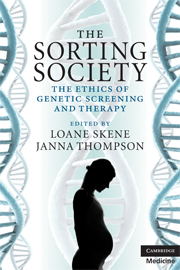Book contents
- Frontmatter
- Contents
- List of contributors
- Preface
- 1 Introduction
- 2 Genetic testing, an informed choice
- 3 Sex selection: sorting sperm as a gateway to the sorting society?
- 4 Cloning to avoid genetic disease
- 5 Procreative Beneficence: reasons to not have disabled children
- 6 Reprogenetic technologies: balancing parental procreative autonomy and social equity and justice
- 7 Genetic technology and intergenerational justice
- 8 Genetic preselection and the moral equality of individuals
- 9 Genes, identity and the ‘expressivist critique’
- 10 Overstating the biological: geneticism and essentialism in social cloning and social sex selection
- 11 The sorting society: a legal perspective
- Index
Preface
Published online by Cambridge University Press: 16 September 2009
- Frontmatter
- Contents
- List of contributors
- Preface
- 1 Introduction
- 2 Genetic testing, an informed choice
- 3 Sex selection: sorting sperm as a gateway to the sorting society?
- 4 Cloning to avoid genetic disease
- 5 Procreative Beneficence: reasons to not have disabled children
- 6 Reprogenetic technologies: balancing parental procreative autonomy and social equity and justice
- 7 Genetic technology and intergenerational justice
- 8 Genetic preselection and the moral equality of individuals
- 9 Genes, identity and the ‘expressivist critique’
- 10 Overstating the biological: geneticism and essentialism in social cloning and social sex selection
- 11 The sorting society: a legal perspective
- Index
Summary
The contents and title of this book were inspired by a workshop held at Melbourne University in November 2005 under the auspices of the Australian Research Council Centre for Applied Philosophy and Public Ethics. The workshop brought together experts from law, medicine and philosophy. Many of those who participated are the authors of chapters in this collection.
The ‘sorting society’ expresses what many people believe will be the outcome of advances in genetic technology: a society in which gender and many characteristics of children are no longer the result of genetic luck but of deliberate selection. The book focuses on the ethical, legal and social issues raised by this technology. Is the prospect of a sorting society something that we should welcome or deplore? Do concerns about how parents or societies might exercise the choice given to them by genetic technology give us reason to restrain its creation or use, and if so how? Would a sorting society increase the freedom of parents and the wellbeing of children or would it undermine values that are central to a liberal democratic society? Would it adversely affect relationships between parents and children or the prospects for future generations?
These are questions of the most profound significance, bearing on the world in which our children and their children and grandchildren will live. Citizens as well as experts need to engage in wise reflection about the development of, use of and restrictions on genetic technology.
- Type
- Chapter
- Information
- The Sorting SocietyThe Ethics of Genetic Screening and Therapy, pp. ix - xPublisher: Cambridge University PressPrint publication year: 2008

